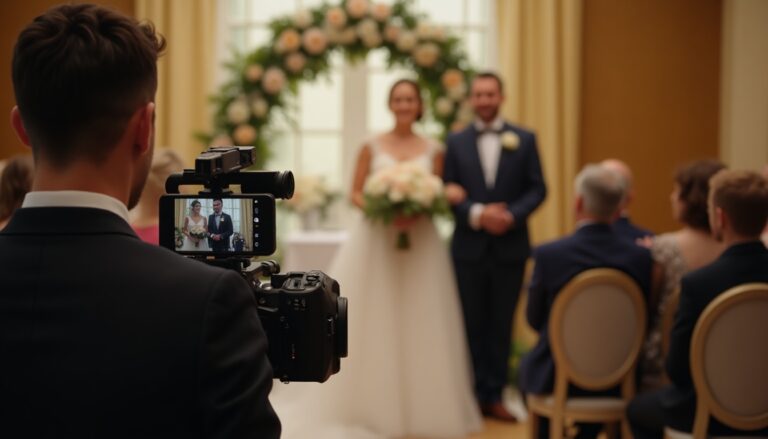Wedding videos capture one of life’s most meaningful moments, making the choice between professional and DIY filming a significant decision for couples planning their big day.
The right approach depends on various factors including budget, desired quality, and how much hands-on involvement you want in preserving your wedding memories.
This quick guide examines the pros and cons of both professional and DIY wedding videography to help you make an informed choice that matches your needs.
Professional Wedding Videography
Benefits
- High-end equipment and multiple camera setups
- Expert lighting and audio management
- Professional editing and color correction
- Experience handling unexpected situations
- Insurance coverage
Drawbacks
- Higher cost ($2,000-$10,000+)
- Limited control over creative direction
- Scheduling constraints with popular videographers
DIY Wedding Video Approach
Benefits
- Significant cost savings
- Complete creative control
- More intimate, personal feel
- Flexibility with timing and shots
Drawbacks
- Equipment limitations
- Less polished final product
- Technical challenges during filming
- Time-consuming editing process
Equipment Considerations
For DIY wedding videos, you’ll need these basic items:
- DSLR or mirrorless camera ($500-$2000)
- External microphone ($100-$300)
- Tripod ($50-$200)
- Memory cards (32GB minimum)
- Extra batteries
Tips for Success
Professional Route
- Book 6-12 months in advance
- Review multiple portfolios
- Get everything in writing
- Discuss shot lists and must-have moments
DIY Approach
- Practice with equipment beforehand
- Assign specific roles to helpers
- Create a detailed shot list
- Test audio in the venue
Making Your Decision
Consider your budget first – professional videography typically starts at $2,000.
Evaluate your technical skills and available time for editing if considering DIY.
Think about the quality level you’ll be happy with years down the road.
Getting Started
For professional videographers, start your search on these platforms:
- WeddingWire
- The Knot
- Local wedding planning groups on social media
For DIY equipment, check these retailers:
- B&H Photo Video
- Adorama
- Rent the Runway (for equipment rentals)
Timeline Planning
Pre-Wedding
- Schedule engagement video shoot (optional)
- Test equipment or meet with videographer
- Create detailed timeline for wedding day
- Confirm power outlet locations at venue
- Plan backup recording methods
Wedding Day
- Getting ready footage (2-3 hours before)
- Ceremony setup (1 hour before)
- Reception coverage (key moments)
- End-of-night highlights
Post-Production Expectations
Professional Timeline
- Initial preview: 1-2 weeks
- Full edit: 2-3 months
- Revision requests: 2-4 weeks
- Final delivery: 3-4 months
DIY Timeline
- Footage organization: 1-2 weeks
- Basic editing: 1-2 months
- Music selection: 1 week
- Final rendering: 1-2 weeks
Preserving Your Wedding Memories
Whether choosing professional or DIY videography, focus on what matters most – capturing genuine moments that tell your unique story.
Consider creating multiple backup copies of your final video and storing them in different locations.
Remember that both approaches can result in beautiful wedding memories when properly planned and executed.
FAQs
1. What are the main differences between professional and DIY wedding videography?
Professional videographers offer expertise, high-end equipment, multiple camera angles, professional audio recording, and editing skills, while DIY involves personal filming with consumer-grade equipment and basic editing capabilities.
2. How much money can I save by choosing DIY wedding videography?
DIY videography can save $2,000-$5,000 on average, as professional wedding videographers typically charge between $1,500-$10,000 depending on package and location.
3. What essential equipment do I need for DIY wedding videography?
You need a good quality DSLR or mirrorless camera, stabilization equipment (tripod/gimbal), external microphones for audio, memory cards, spare batteries, and basic lighting equipment.
4. What are the risks of choosing DIY wedding videography?
Risks include technical difficulties, poor audio quality, missing key moments, limited angles, shaky footage, and less polished final results due to inexperience and equipment limitations.
5. How far in advance should I book a professional wedding videographer?
Professional videographers should be booked 8-12 months before the wedding date, as experienced professionals often get booked quickly, especially during peak wedding season.
6. What should be included in a professional wedding videography package?
Standard packages typically include full ceremony coverage, reception highlights, multiple camera operators, professional audio recording, drone footage (optional), highlight reel, and full-length edited video.
7. Can I hire a professional videographer but edit the footage myself to save money?
While possible, most professional videographers don’t offer raw footage-only packages as their reputation depends on the final product quality and editing style.
8. What’s the typical turnaround time for professional wedding videos vs. DIY editing?
Professional videographers usually deliver final videos within 8-12 weeks, while DIY editing can take several months depending on experience and available time.
9. Should I have both a professional photographer and videographer?
While not mandatory, having both provides comprehensive coverage as photographers capture still moments while videographers record motion and sound, offering different perspectives of your day.
10. What backup systems do professional videographers use to secure footage?
Professional videographers use multiple memory cards, backup cameras, and store footage on multiple hard drives to ensure wedding footage isn’t lost.








